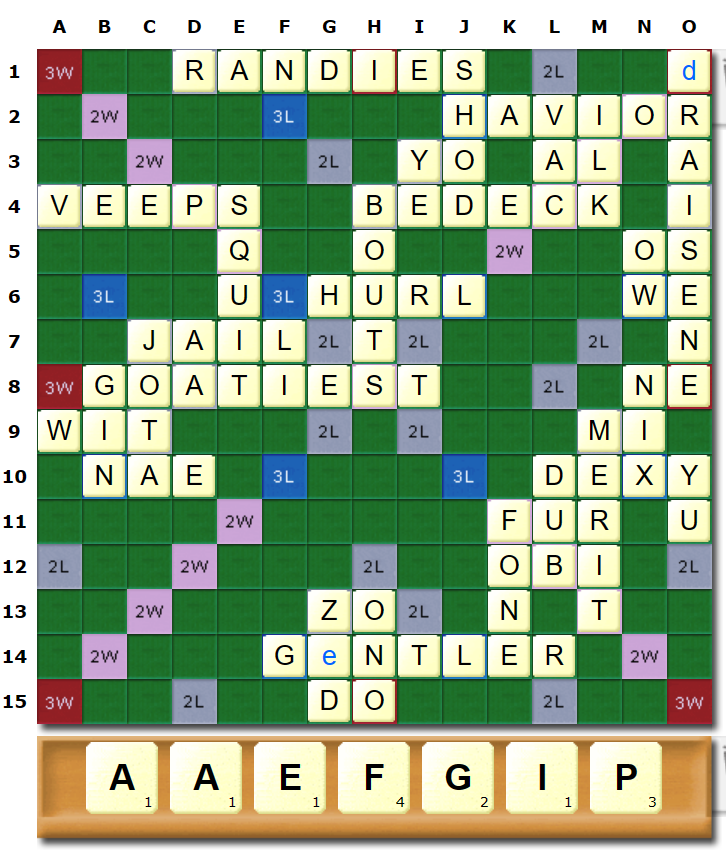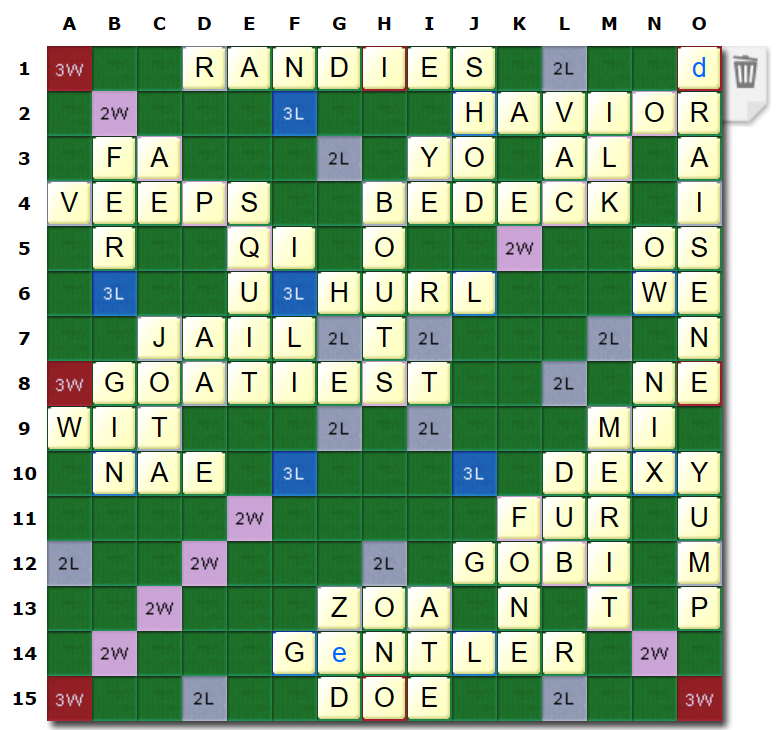At the recent Coventry tournament Graham had an unusual end to the game.
Here is the board.

The scores are :
Graham 413 (rack AAEFGIP). Opponent 457 (with 3 letters C, M & R).
Graham to play, but can he win ? What is the highest score Graham can achieve ?
The first decision for Graham is … can my opponent play out next move? If he can, the game is lost.
Graham’s opponent has three consonants and needs at least one vowel to play any move. The only vowels allowing three consonants to be played are the Es in VEEPS (top left). In fact MERC or CREM are both playable. Therefore Graham’s next move MUST block both Es so that MERC and CREM cannot be played.
Graham has quite good letters for playing around or parallel to the Es – some sample moves include PEG c3 down (12) or FE c3down (10). The highest scoring block is EF b3 across scoring 22.
Before we choose a good blocking move, consider what our opponent can play thereafter, and whether we can get close to winning. There is only one vowel on the board that will allow our opponent to play two consonants (ERM c10 down scoring 10). Our opponent would do better playing consonants individually. The M could score 11 YUM 012 down, or MILK m1 down (10). The R will play as part of ER in a number of positions with the maximum being 4.
But what of our opponent’s C ? Closer inspection of the board would suggest that once CREM/MERC is blocked, the C is unplayable.
This means our opponent will have 2 scoring moves, and as long as Graham plays sensibly, he may be able to eke out a win.
Let us review some tentative scores :
Assuming our opponent plays YUM and ER they will score 15 giving a total of 472. They will lose 3 (unplayable C) so their total will be 469.
We would need to score 57 points to reach 470, of which 3 will be the value of our opponent’s C. So can we score 54 points with our letters ?
There are some nice scoring options on the board :
- Our blocking move, say PEG will score 12 (note if we play the highest scoring EF, our opponent can play CEE, which will defeat us)
- The I can be played for 11 (QI – e5)
- An A can be played making AG/AZO or ZOA/AT both scoring 15, but must be played LAST as both will enable the C to be played (CAG or CAT respectively)
- The F could score 10 K4, or 9 at G8 (subject to where our opponent’s R is played). Note : EF f9 across scores 21 providing our opponent doesn’t block it)
- AE f2 across scores11.
Playing PEG 12, QI 11, ZOA 15 (as last move), EF 9, AE 11 gives us 58 – enough to win… just!
Another method may be to play with EF (b4 down 5), then play GAVE (a2 down 13), then AGAVE (a1 down for 27), QI (11), followed by GIP (a2 across 12). This sequence of plays scores 68 more than enough to win!
Of course much depends on what our opponent plays, as it may mean some of our best plays are taken.
Taking this into account, and ‘assuming’ our opponent scores the MOST they can on any move Richard came up with the highest scoring solution thus :
|
Graham |
Graham total |
Opponent |
Opponent Total |
|
FA B3 across for 19 |
432 |
YUM O10 down for 11 |
468 |
|
YUMP O10 down for 11 |
443 |
FER B3 down for 6
|
474 |
|
TE/DOE at I14 down 6 |
449 |
Pass – unplayable C |
474 |
|
GOBI for 7 J12 across |
456 |
Pass |
|
|
QI at E5 across for 11 |
467 |
Pass |
|
|
ZOA/ATE at F13 across for 17 |
484 |
End of game |
|
|
Final scores +C |
487 |
-C |
471 |
A fantastic solution from Richard! Well done!
On closer inspection, if Graham or Graham’s opponent knew YUMPIE then playing YUIM 11 is a definite losing move as YUMPIE scores 39. Better to play MILK for 10.
Also we have assumed that our opponent played the R. It may be more tactical for our opponent to keep the R with the C, which will prevent Graham from playing an open A (yielding ARC/CAR) or E (REC). In the actual game this is what happened. Graham forgot the R, played an open A, and lost the game to ARC!
Summary :
It is frequently useful to block an opponents outplay if you can see it. Also if they have an unplayable tile, playing your remaining tiles relatively slowly may accrue enough points to seal the game!
Here is Richard's board :

